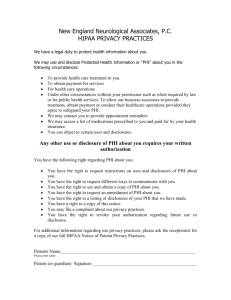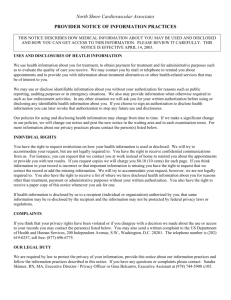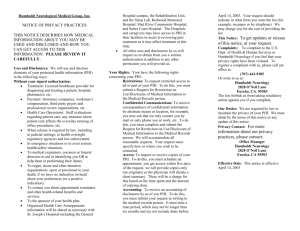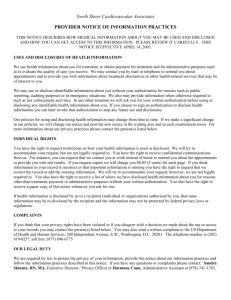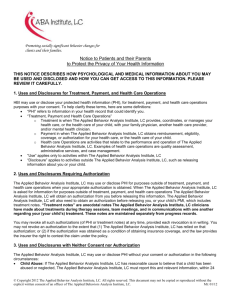Notice of Privacy Practices
advertisement
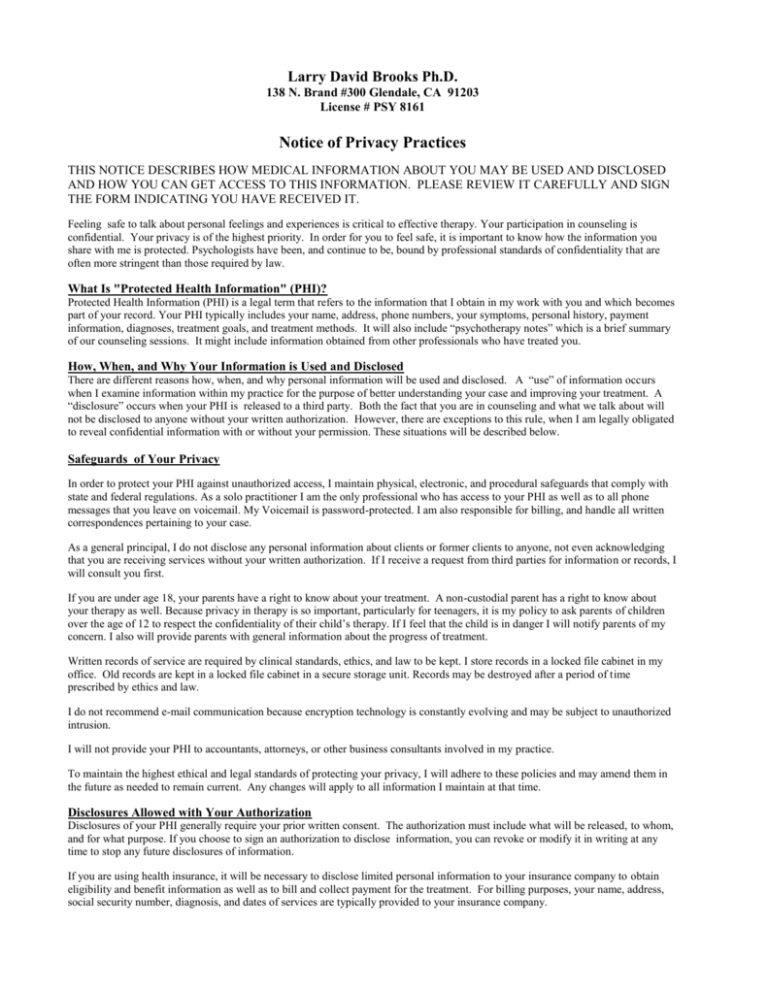
Larry David Brooks Ph.D. 138 N. Brand #300 Glendale, CA 91203 License # PSY 8161 Notice of Privacy Practices THIS NOTICE DESCRIBES HOW MEDICAL INFORMATION ABOUT YOU MAY BE USED AND DISCLOSED AND HOW YOU CAN GET ACCESS TO THIS INFORMATION. PLEASE REVIEW IT CAREFULLY AND SIGN THE FORM INDICATING YOU HAVE RECEIVED IT. Feeling safe to talk about personal feelings and experiences is critical to effective therapy. Your participation in counseling is confidential. Your privacy is of the highest priority. In order for you to feel safe, it is important to know how the information you share with me is protected. Psychologists have been, and continue to be, bound by professional standards of confidentiality that are often more stringent than those required by law. What Is "Protected Health Information" (PHI)? Protected Health Information (PHI) is a legal term that refers to the information that I obtain in my work with you and which becomes part of your record. Your PHI typically includes your name, address, phone numbers, your symptoms, personal history, payment information, diagnoses, treatment goals, and treatment methods. It will also include “psychotherapy notes” which is a brief summary of our counseling sessions. It might include information obtained from other professionals who have treated you. How, When, and Why Your Information is Used and Disclosed There are different reasons how, when, and why personal information will be used and disclosed. A “use” of information occurs when I examine information within my practice for the purpose of better understanding your case and improving your treatment. A “disclosure” occurs when your PHI is released to a third party. Both the fact that you are in counseling and what we talk about will not be disclosed to anyone without your written authorization. However, there are exceptions to this rule, when I am legally obligated to reveal confidential information with or without your permission. These situations will be described below. Safeguards of Your Privacy In order to protect your PHI against unauthorized access, I maintain physical, electronic, and procedural safeguards that comply with state and federal regulations. As a solo practitioner I am the only professional who has access to your PHI as well as to all phone messages that you leave on voicemail. My Voicemail is password-protected. I am also responsible for billing, and handle all written correspondences pertaining to your case. As a general principal, I do not disclose any personal information about clients or former clients to anyone, not even acknowledging that you are receiving services without your written authorization. If I receive a request from third parties for information or records, I will consult you first. If you are under age 18, your parents have a right to know about your treatment. A non-custodial parent has a right to know about your therapy as well. Because privacy in therapy is so important, particularly for teenagers, it is my policy to ask parents of children over the age of 12 to respect the confidentiality of their child’s therapy. If I feel that the child is in danger I will notify parents of my concern. I also will provide parents with general information about the progress of treatment. Written records of service are required by clinical standards, ethics, and law to be kept. I store records in a locked file cabinet in my office. Old records are kept in a locked file cabinet in a secure storage unit. Records may be destroyed after a period of time prescribed by ethics and law. I do not recommend e-mail communication because encryption technology is constantly evolving and may be subject to unauthorized intrusion. I will not provide your PHI to accountants, attorneys, or other business consultants involved in my practice. To maintain the highest ethical and legal standards of protecting your privacy, I will adhere to these policies and may amend them in the future as needed to remain current. Any changes will apply to all information I maintain at that time. Disclosures Allowed with Your Authorization Disclosures of your PHI generally require your prior written consent. The authorization must include what will be released, to whom, and for what purpose. If you choose to sign an authorization to disclose information, you can revoke or modify it in writing at any time to stop any future disclosures of information. If you are using health insurance, it will be necessary to disclose limited personal information to your insurance company to obtain eligibility and benefit information as well as to bill and collect payment for the treatment. For billing purposes, your name, address, social security number, diagnosis, and dates of services are typically provided to your insurance company. Certain insurance companies require pre-authorization of treatment before services will be reimbursed as well as periodic treatment plans in order for them to authorize additional treatment. Treatment plans typically include the following: symptoms, diagnosis, risk assessment, goals, and progress. This information will become part of the insurance company’s file. Any institutions outside my office that have access to your PHI such as insurance companies are similarly required to protect your PHI by law. In order to better understand your situation, I may ask for your authorization to communicate with or obtain records from other treating professionals, such as your physician or another therapist, who are either currently, have formerly, or will be providing service to you. To maintain high standards of care, I periodically obtain consultation from colleagues about cases. In such consultations, any information which could identify you will not be disclosed. Information, such as hospital records, that has been provided to me by other health care professionals, will not be released. Exceptions to Privacy I may disclose PHI without your consent in the following circumstances. Child Abuse. If there is a reasonable suspicion of physical, and or sexual abuse or neglect of an identifiable child under the age of 18, I must report it to designated public agency. If I have knowledge of or reasonably suspect that mental suffering has been inflicted upon a child, I may report it. Elder and Dependent Adult Abuse. If there is a reasonable suspicion of physical abuse, abandonment, abduction, isolation, financial abuse or neglect of an elder or dependent adult, I must report it to designated public agency. Danger to self or other. If you communicate to me a serious threat of physical violence against an identifiable victim, I must make reasonable efforts to communicate that information to the potential victim and the police. If I have reasonable cause to believe that you are a danger to yourself or others, or unable to care for yourself, I may take protective action, including hospitalization or contact family members or others who can help provide safety. Limited information may be disclosed to facilitate this process. Judicial or Administrative Proceedings: If you are involved in a court proceeding and a request is made about the professional services that I have provided you, the court might order me to provide records or testimony concerning you. Health Oversight: If a complaint is filed against me with the California Board of Psychology, the Board has the authority to subpoena confidential information from me relevant to that complaint. HIPPA Compliance: I may be required to disclose some information to government agencies that check to determine compliance with the privacy laws. Worker’s Compensation: If you file a worker’s compensation claim, I must furnish a report to your employer, incorporating my findings about your injury and treatment as may be required by the administrative director of the Worker’s Compensation Commission in order to determine your eligibility for worker’s compensation. Medical Emergency: If you become unconscious in the office or are in severe pain and cannot communicate, I may call emergency medical services and/or the emergency contact you named on the information form. Unpaid bill: If you fail to assume financial responsibility for your bill, limited personal information may be disclosed for purposes of debt collection, such as your name, nature of services you have received, and the amount due. Incapacitation or Death: If you are incapacitated or deceased, your information remains secure. However, disclosure may be authorized by the entity with health care power of attorney or charged with making decisions about your estate. Therapist’s illness: In the event I am incapacitated, I have designated one trusted colleague to administer all confidential matters as necessary for the continuity of your care. What Rights You Have Regarding Privacy You have the right to inspect or obtain a copy of your PHI. Under rare conditions where I feel the information may cause harm to you, I might deny this request. Instead I will provide you with a summary of the information. I will discuss with you my reasons as well as recourse you have for appeal. If you request a copy of your PHI, there may be a reasonable charge for the time required to copy this information. You have the right to request restrictions on certain disclosures of your PHI. I will use my professional judgment to respond to this request and am not required to agree to this restriction . If you believe that there is a mistake in your PHI, you have the right to request that I correct the existing information or add the missing information. You must provide the request and your reason for the request in writing. You have the right to get a list of instances in which I have disclosed your PHI. You can receive information at an alternate address or by alternate means (for example, fax instead of regular mail).so long as I can easily provide the information to you in the format you requested. Changes of Privacy Policy I reserve the right to change privacy policies and practices described in this notice. Unless I notify you of such changes, I am required to abide by the terms currently in effect. You will receive a copy of this policy at the start of counseling and may request a copy of changes by contacting me at 818) 243-0839 or at 138 N. Brand #300, Glendale, CA 91203. Questions or Complaints about Privacy If you have questions or believe your privacy has been violated, you are encouraged to address your concerns directly with me, I can be reached at (818) 243-0839 or at 138 N. Brand #300, Glendale, CA 91203. You may also contact the Secretary of the Department of Health and Human Services at 200 Independence Avenue S.W., Washington, DC 20201, by calling (202) 619-0257, or by accessing the internet at http://www.hhs.gov/ocr/hipaa. You have specific rights under the Privacy Rule. I will not retaliate against you for exercising your right to complain. This notice went into effect on April 14, 2003. Larry Brooks Ph.D. Licensed Clinical Psychologist Receipt and acknowledgement of Notice of Privacy Practices Client Name: DOB I hearby acknowledge that I have received and have been given an opportunity to read a copy of the Notice of Privacy Practices of Larry Brooks Ph.D. I understand that if I have any questions regarding this notice I can contact Dr. Brooks. Signature of Client Date Signature of Parent or Guardian Date If you are signing as a personal representative describe your relationship Client Refuses to Acknowledge Receipt: Larry Brooks Ph.D. Date

